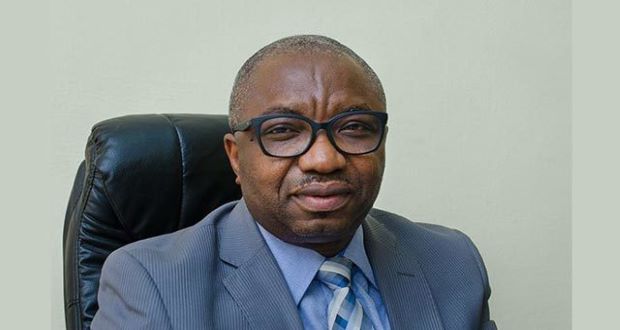E-Business
NDPB Partners ID4D in Boosting National Economy

The Nigeria Data Protection Bureau (NDPB) as part of its efforts in making data privacy a cornerstone of sustainable digital economy in the country are collaborating with the Nigeria Digital Identification For Development Project (ID4D) in proactively strategizing ways to develop initiatives that will boost the nation’s economy.

While appreciating the ID4D for their effort thus far in the development of the Nation’s economy, the NDPB National Commissioner (NC), Dr Vincent Olatunji CPPPS, CDPO, FIIM who visited the project facility today in Abuja commended the Coordinator of the Ecosystem Strategic Unit (ECSU), Mr. Solomon Musa Odole and the Coordinator of the Project Implementation Unit, Mr Ibrahim Dikko for an exemplary leadership and for coordinating the World Bank, European Investment Bank (EIB) and the Agence Francaise de Development (AFD) in boosting national development.
“With your coordination of this team in which your task is really important to Nigeria coupled with a supervising Minister, Prof Isa Ali Ibrahim Pantami who is a go getter and ready to drive the digital economy sector to enviable heights, I am convinced of an accelerated boost in development of the National Economy”, Olatunji stated.
The NDPB Boss however urged the hosts to always make the interest of the country their top priority by strategizing ways of developing initiatives that can assist the government.
He stated that the Bureau currently relies on the NDPR but with the cooperation of the ID4D are working round the clock in harmonising all related documents in getting an approval for a principal legislation on data privacy and protection
Emphasizing his point further, Olatunji asserted that National Identity and Digital Economy wouldn’t be functional without proper digital privacy and protection.
He disclosed that the industry’s relevant stakeholders are already being engaged on the drafting of the data protection bill with the aim of incorporating their contributions and critiques into it to make it more robust and generally accepted.
“After the drafting of the bill, we will need to engage stakeholders and make them see it as their own because they are making important contributions to whatever we are doing. We are already mobilizing them to get them ready for the bill that is coming”, Olatunji mentioned.
Giving his welcome address earlier, Mr Solomon Musa Odole expressed his pleasure at the visit from the NDPB team and congratulated the NC on the official launching of the Bureau’s website, logo and core values.
While offering ID4D’S support to the bureau in accomplishing their mandate, Solomon stated that the program’s activities for the year regarding data protection have been listed out and will be made available to the NC for his review before onward transmission to the World Bank for clearance.
“I always tell my colleagues that the NDPB happens to be our best ally when it comes to work because for now we are working with you and doing everything possible to support the bureau and ensure all your goals are achieved”, Solomon concluded
Buttressing Mr Somolon’s remark, Mr Ibrahim Dikko commended the Bureau for her unprecedented achievements since it’s launch and gave assurances of the programme’s support in providing a well protected coverage of digital ID to all Nigerians.
E-Business
South Korea Joins List of Countries Banning DeepSeek over Security Concerns

South Korean authorities have temporarily blocked new downloads of the DeepSeek artificial intelligence (AI) app, citing concerns over the company’s handling of user data.

The country’s Personal Information Protection Commission (PIPC) announced the decision on Monday, saying that the Chinese AI startup had failed to fully comply with South Korea’s data protection laws.
According to PIPC, DeepSeek recently appointed legal representatives in South Korea and admitted to partially neglecting regulatory considerations regarding user privacy.
“The Chinese startup appointed legal representatives last week in South Korea and had acknowledged partially neglecting considerations of the country’s data protection law,” the PIPC said.
The commission added that the app’s service would resume once the company implements improvements in accordance with national privacy laws.
According to Reuters, when asked about South Korea’s move, a spokesperson for China’s foreign ministry said the Chinese government prioritises data privacy and security, ensuring compliance with legal standards.
The spokesperson also said China does not require companies or individuals to collect or store data in violation of laws.
The ban follows similar actions by other governments.
On February 4, Australia prohibited the use of DeepSeek on government devices due to security concerns.
Italy’s privacy regulator recently blocked the AI service, citing the company’s failure to address data policy issues.
Taiwan has also warned about potential risks related to cross-border data transmission and information leaks.
Also, regulators in Ireland and France have launched investigations into DeepSeek’s data-handling practices.
DeepSeek gained global adoption for its advanced human-like reasoning capabilities and open-source model.
In January, it surpassed OpenAI’s Chatgpt as the most downloaded free app on the Apple store.
E-Business
AU Endorses Nigeria as AfCFTA Digital Trade Champion

The African Union (AU) has officially designated Nigeria as the Digital Trade Champion under the African Continental Free Trade Area (AfCFTA) Digital Trade Protocol, citing the country’s leadership in digital enterprise and innovation.

The endorsement came at the 38th Ordinary Session of the Assembly of Heads of State and Government, which concluded on Sunday in Addis Ababa.
Nigeria’s proactive role in advancing the digital trade protocol, adopted in February 2024, was a key factor in the decision.
The AfCFTA Digital Trade Protocol encompasses eight annexes covering crucial areas such as rules of origin, digital identities, cross-border data transfers, online safety, and financial technology. The protocol is expected to provide a robust framework for Africa’s digital economy.
According to a statement issued on Monday by Special Adviser to the President on Information and Strategy, Bayo Onanuga, former President of Niger Republic and AU AfCFTA Champion, Mahamadou Issoufou, praised Nigeria’s leadership, particularly for convening the Digital Economy Roundtable in January.
“No organization, region, or continent has negotiated or adopted such a comprehensive legal instrument on digital trade, positioning the African continent to benefit from the digital economy for innovation and job creation,” Issoufou said in his progress report to the AU Assembly.
He also highlighted Africa’s growing influence in digital innovation, particularly in mobile banking and financial technology, and noted that the protocol would create an enabling environment for young African entrepreneurs.
“The AfCFTA Protocol on Digital Trade will establish a conducive environment for these young people to fully participate in Africa’s digital economy,” Issoufou added.
Reflecting on the roundtable in Abuja, he commended President Bola Tinubu and his administration for facilitating discussions with key stakeholders.
“The Roundtable was attended by young pioneers in Fintech, mobile banking and other areas of the digital economy. It was evident from the discussions that young people are eager to take advantage of Africa’s digital economy through the AfCFTA Protocol on Digital Trade”, he said.
Speaking at the AU summit, Nigeria’s Minister of Industry, Trade and Investment, Dr. Jumoke Oduwole, described the AU’s endorsement as a milestone in Africa’s economic development.
“Africa has demonstrated global leadership by pioneering the first-of-its-kind AfCFTA Protocol on Digital Trade—establishing a comprehensive regulatory framework,” Dr. Oduwole stated.
She emphasized that the protocol is a “game changer” for the continent, predicting that it would generate millions of jobs, contribute billions to Africa’s GDP, and attract significant investments in digital infrastructure.
E-Business
Schmidt, Ex Google Chief Says AI Risky in Terrorist Hands

Eric Schmidt, former Google CEO has expressed concerns about the extreme risks posed by artificial intelligence (AI) falling into the hands of terrorists or rogue states.

Eric Schmidt, former Google CEO
He warned that nations such as North Korea, Iran, and Russia could adopt AI technologies to develop weapons capable of causing significant harm, including biological weapons.
Schmidt urged governments to oversee private tech companies, emphasising, “The real fears I have are not the ones most people discuss about AI, I talk about extreme risk.”
“I’m always worried about an ‘Osama Bin Laden’ scenario, where truly evil individuals take control of some aspect of modern life to harm innocent people,” he added.
With private companies driving AI advancements, he stressed the need for careful government monitoring and regulation. “It’s really important that governments understand what we’re doing and keep their eye on us,” he said.
His remarks followed a two-day AI summit in Paris, where the UK and the U.S. declined to sign a communiqué outlining the future direction of AI. The declaration on “inclusive and sustainable artificial intelligence for people and the planet” was endorsed by 57 countries, including India, China, the Vatican, the EU, and the African Union Commission.
The UK justified its decision, stating that the agreement lacked “practical clarity” on global AI governance and national security concerns.
Schmidt supports U.S. export controls restricting the sale of advanced AI microchips to certain countries, aiming to slow adversaries’ progress in AI research.
He also highlights the importance of international collaboration on AI safety, suggesting that cooperation with nations like China is essential to addressing global AI challenges.

 E-Financial2 days ago
E-Financial2 days agoSERAP Gives CBN 48-Hour Ultimatum to Withdraw ATM Fee Hike

 E-Financial2 days ago
E-Financial2 days agoFG Seeks Fresh $300m Loan from World Bank for Health Security

 General News2 days ago
General News2 days agoFG Drops Merger of NCAA, NAMA

 News2 days ago
News2 days agoBinance Chief Insists Some FG Officials, Reps Demand $150m Bribe

 News2 days ago
News2 days agoinDrive Unveils Cashless Bank Transfer Feature in Nigeria

 E-Financial2 days ago
E-Financial2 days agoCardinalStone Acquires Radix Pension Managers

 Telecom18 hours ago
Telecom18 hours agoToriola, MTN Nigeria CEO again Defends Tariff Hikes amidst Backlash

 Telecom2 days ago
Telecom2 days agoNITDA Pledges to Foster Innovation with Cloud Infrastructure and AI Applications


























